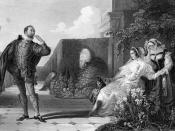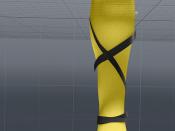In Act 2 Scene 3 Malvolio is drawn from his room in the dead of night (where one assumes he is either sleeping or engaging in some form of relaxation) to stop the disturbing noise that Sir Toby, Sir Andrew, Feste and Maria are making in a different part of the house.
He bursts in on the scene with a flurry of accusing questions in a state of what one may almost describe as 'near-lunacy'. His first question, 'My masters, are you mad?', although indeed directed at his 'masters', implies that the level of noise, and therefore disturbance being caused, is such that only someone in a state of madness would be negligent enough to create it.
The quantity and seriousness of the 'allegations' that Malvolio puts against the present company ('Is there no respect of place, persons nor time in you?') suggests that an actor playing Malvolio should have his voice raised and his eyebrows high up, giving an impression of disbelief at their immaturity and disregard for the other members of the household.
He would use this heightened state as a demonstration to the company of how major the implications are, and for his next speech he would have quite a different approach.
He goes on to address Sir Toby individually, saying that he must 'separate [himself] and [his] misdemeanours', otherwise he will no longer be welcome in Olivia's house. For this the actor would have transformed himself into the calm, respectable Malvolio that the household knows, and his voice would be level, almost emotionless, as if reading out the terms of an ultimatum.
Sir Toby ignores Malvolio's request for peace, dismissing him as '[nothing] more than a steward', and orders Maria to bring in another stoop of wine. Malvolio follows suit and turns as well to...


